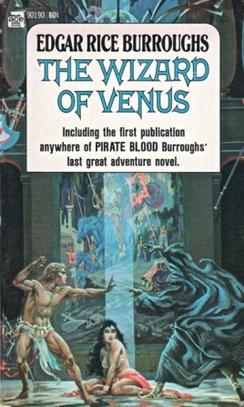 First edition | |
| Author | Edgar Rice Burroughs |
|---|---|
| Cover artist | Roy G. Krenkel, Jr. |
| Language | English |
| Series | Amtor |
| Genre | Science fantasy |
| Publisher | Ace Books |
Publication date | 1964 |
| Publication place | United States |
| Media type | Print Paperback) |
| Pages | 136 |
| Preceded by | Escape on Venus |
The Wizard of Venus is a science fiction novella by American writer Edgar Rice Burroughs, as well as the title of a collection in which it was later published together with an unrelated story. "The Wizard of Venus" is the final story in Burroughs's Venus series (sometimes called the "Carson Napier of Venus series"). Written in 1941, the piece remained unpublished until 1964, fourteen years after the author's death. [1] Burroughs intended it to be the opening piece in a sequence of stories to be brought together later in book form, as he had done in the instance of the previous Venus volume, Escape on Venus . He began the first follow-up tale, [2] only to abandon the project in the wake of the Japanese attack on Pearl Harbor; the text of the aborted sequel is now lost.